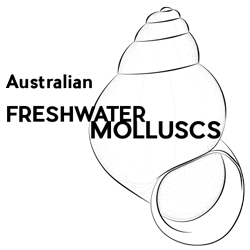
The small umbilicus and relatively high spire distinguish this species from other species of Trochidrobia. It differs from the sympatric T. minuta in its larger size (up to 1.7 mm maximum diameter), wider umbilicus and taller spire.
Trochidrobia inflata Ponder, Hershler & Jenkins, 1989
Class Gastropoda
Infraclass Caenogastropoda
Order Littorinida
Suborder Rissoidina
Superfamily Truncatelloidea
Family Tateidae
Genus Trochidrobia Ponder, Hershler and Jenkins 1989
Original name: Trochidrobia inflata Ponder, Hershler & Jenkins, 1989. In Ponder, W. F., Hershler, R. & Jenkins, B. (1989). An endemic radiation of hydrobiid snails from artesian springs in northern South Australia: their taxonomy, physiology, distribution and anatomy.Malacologia 31: 1-140.
Type locality: Freeling Springs, South Australia.
Shallow water in lower parts of artesian spring outflow living together with T. minuta and species of Fonscochlea.
Freeling Springs complex, northern part of Lake Eyre Supergroup, northern South Australia.
Murphy, N. P., Breed, M. F., Guzik, M. T., Cooper, S. J., & Austin, A. D. (2012). Trapped in desert springs: phylogeography of Australian desert spring snails. Journal of Biogeography 39(9): 1573-1582.
Ponder, W. F., Hershler, R. & Jenkins, B. (1989). An endemic radiation of Hydrobiidae from artesian springs in northern South Australia: their taxonomy, physiology, distribution and anatomy. Malacologia 31: 1-140.